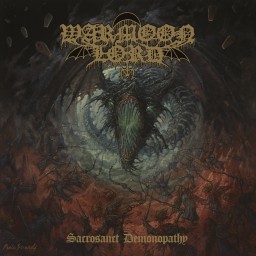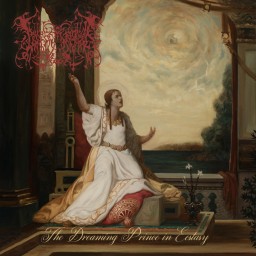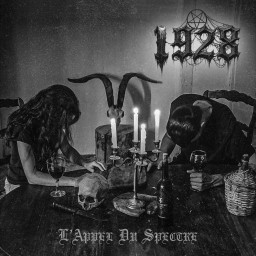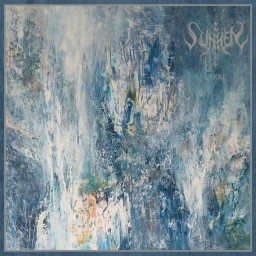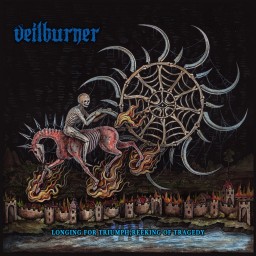Latest Reviews
My initial thoughts after hearing Zerfall was how much more progressive this sounds than the previous record. This kind of had that transition from pure atmospheric black metal to progressive that a band like Fen had from Winter to The Dead Light. Ellende unfortunately do not have the same highs as Fen does and this record, while still okay, is far from excellent. With this bands roots in DSBM, the first track, "Wahrheit" is very fast and groovy and the technicality in the percussion takes away a bit from that feeling of isolation. The record does get progressively more slow as it moves on, which is a similar trait that Todbringerin shared and later moments like "Zeitenwende" and "Reise" excel. But the major key of "Ode ans Licht" set a very unusual expectation for not just the track itself, but what followed later on in the album.
As a whole however, I think that Zerfall is a record that has some experience and has learnt from Todbringerin's mistakes. The changes in tempos and paces make Zerfall feel like a much more complete project instead of a monotonous drone the whole way through. Some progressive elements and a knack for dark storytelling help this record stand on its own. It's about the same length as Todbringerin and yet it feels much more concise. That being said, I do hope that Ellende plan on doing something else with this sound in the future. As it stands, while Zerfall is just a simpler version of Fen's The Dead Light, I would find it difficult to appreciate this sound if it didn't try to distance itself more from that influence.
Best Songs: Wahrheir Teil I, Übertritt, Zeitenwende Teil I, Zeitenwende Teil II
Last year I checked out the most recent album from the solo black metal project, Blackbraid and it turned out to be one of my more enjoyable metal records from the year. I figured that, since I do not partake in the extreme variety of metal as much as I would like anymore, now seems like a good a time as any to show some love for one of Blackbraid's formative albums; so let's go back and hear how 2023 Blackbraid differs from the modern day sound.
I must admit, this album took me a while to get into. This is not helped by the "Autumnal Hearts Ablaze" intro before the record beats you over the head with "The Spirit Returns". However, the main reason is because Blackbraid II just feels a little tardy. I can let some of that slide given this is an older record, but even for normal black metal standards, it does feel cheesy. Some of the transitions are so wacky that I honestly thought that they must be a joke. "Twilight Hymn of Ancient Blood" strikes me immediately as it begins with this sludgy, almost doom metal groove, which (if you ignore the interlude "Celestial Passage") is a great segue out of the high intensity, foot on the gas pedal of "A Song of Death on Winds of Dawn". But then, about halfway through the song, it switches gears and becomes a thrash anthem...without the anthem part. Sgah’gahsowáh retains their poetic delivery of the words rather than hammering home one particular line of dialogue as one would expect from a band like Warbringer, Havok, or Enforced. The shame is that it actually sounds really cool on its own, but as an extension of the first half of the track, it becomes corny as hell.
Not all the transitions on this record are bad mind you. "The Wolf That Guides the Hunters Hand" is a song that has an impactful punk flare to it, before gradually mellowing out for its conclusion down to a crawl. I enjoyed how "Moss Covered Bones on the Altar of the Moon" builds over its runtime, only to collapse right back down into a doom-y groove the same way it began. And I would be remised if I didn't mention the incredible chemistry between "Moss Covered Bones on the Altar of the Moon" and "A Song of Death on Winds of Dawn". The way the first one ends on a standstill before the next song ramps up the intensity at a blistering pace was well done. It was a shame that tempo could not be maintained throughout the first section of "A Song of Death on Winds of Dawn" though.
I felt like, after a few listens, Blackbraid II grew on me. I can hear the vision and how that vision has evolved to the point where Blackbraid are now after Blackbraid III. The record does have some significant hurdles that need to be ascended in order to appreciate what is on the other side, but if you can weather the turbulence, you'll find a very respectable melodic black metal album.
Best Songs: The Wolf That Guides the Hunters Hand, Moss Covered Bones on the Altar of the Moon, A Song of Death on Winds of Dawn, Sadness and the Passage of Time and Memory
Immortal continue their style of riff-driven Black Metal, still heavily influenced by Thrash. And it’s still delicious.
Honestly, there’s not too much to say about the album if you’ve heard the previous few. Perfected Black-Metal shrieks that are low, intelligible and strong – check. Fantastic riffing finding that sweet spot between dissonant and melodic – check. Walls of Black Metal Tremolo picked guitar – check. Rhythm section that is technical and varied far and above the standard for Black Metal – check. Bass that can be FELT – check. Lyrical endeavors that are on-topic yet serious, epic, and triumphant – check. No weaknesses and every strength one could hope to find in the genre.
There was just one thing that stuck out to me about this album, and that’s the fact that the production is so damn HEAVY. Most Black Metal albums have paper thin production, and even better produced stuff usually leans on the treble-heavy side of Metal. Sons of Northern Darkness feels like a sledgehammer of solid ice bashing your head in repeatedly. You can really hear the power of the drums and bass crushing you under their weight. I can’t quite recall whether or not the previous records had such power on the production end, but this is probably the best production I’ve heard on a Black Metal album. Mind you, it’s not overproduced at all. There’s still chilly walls of buzzing guitars, and even the leads have an aspect of messy imperfection to them. It still sounds natural, sounds like Black Metal – but God is it powerful.
I was quite blown away by Agalloch’s debut album. Despite the music being relatively simple, they were already masters at crafting melancholic guitar leads and somber chord progressions that evoked a dark, emotional atmosphere. The songs were so memorable they sounded like a band that had long since mastered their craft rather than a debut. I had high hopes for their next album.
The Mantle is usually regarded as not only the band’s best, but one of the greatest Metal albums of all time, particularly standing as a monolith of Post-Metal. However, the first thing that stands out about this album is that not only is there a lot less extreme Metal (Black Metal influences here are relegated to secondary) but there’s also just a lot less Metal in general. There is so much Folk (primarily Neofolk and Dark folk) that it competes with Post-Metal as the primary genre for the album.
Thanks to this folkiness, the album is exceptionally pagan and nature-oriented, the whole journey feeling like a lonely camping expedition in the dense Cascadian forest mountains of North America. Constantly stumbling upon native burial grounds and bygone mythology while trying to escape the thoughts and feelings of the girl who just left you. This is all captured in spades, and the shift in sound from their debut creates a far more unique experience that even today remains an enigma.
The songwriting for the most part weaves acoustic passages both between and within the Metal tracks, layering guitars atop one another as they build towards crescendos. Many simple but effective guitar melodies will slowly change and build upon each other in a slightly droning fashion, resulting in a smooth ascension towards harmonic peaks. There ARE still extreme Metal sections left, and such passages with black shrieks and pounding double bass drums provide much needed energy and aggression to the otherwise passive music.
Now for all its praise, I must say, the album was a slight disappointment and step down from the debut for me. Some of the acoustic oriented tracks just sounded a bit too generic – like your average campfire dude with a guitar playing the 6 chords he knows. There is a lot of instrumental stuff here, and while some of it is exceptional (Odal, the second half of The Hawthorne Passage), other tracks just feel a bit pointless (A Celebration for the Death of Man, The Lodge) like they don’t have a strong enough idea to make them their own song, and would have been better worked into a longer track rather than standing on their own. The lyrics and vocals are quite enjoyable for me, so the final track A Desolation Song is quite good thanks to the personal, introspective lyricism despite the exceedingly simple music; the aforementioned instrumental tracks are sorely lacking because they don’t have any poetic lyrics to make up for their uneventful songwriting.
Another thing I will say – the shift away from extreme Metal towards Folk, and much of this album being clean and acoustic, makes it FAR more accessible. I have to wonder if the only reason it’s considered such a masterpiece is because it can be enjoyed by far more people than a Black Metal album can.
Let there be no mistake though; this is a FANTASTIC album. The ONLY reason I have some harsh words for it is because I am coming off of their incredible debut, and had my expectations set to the sky. If I had heard this one first, I think it would have blown me away in a totally different way. Incredibly unique experience in the Metal spectrum. I recommend this one for a nature hike in winter.
The first of Bathory’s Nordland duo, which closed out the band’s career. I believe it was supposed to be a saga of 4 before Quarthon tragically passed. At this point in the band’s career, Bathory has had some crazy highs and lows, so how does their penultimate effort pan out?
Of all Bathory’s previous albums, I would say Nordland I sounds closest to Blood on Ice. Unfortunately, that’s not a high compliment from me, as that album is one of my less-favored from the band’s catalogue. Blood Fire Death is fantastic in its dark, evil, and aggressively heavy take on the genre, melding Blackened Thrash with the epic atmospheres and thematics of what became Viking Metal. Hammerheart leaned full-on into the grand, epic atmospheres and passionate storytelling of the genre, and who could forgot the doomy masterpiece One Rode to Asa Bay?
Nordland I doesn’t do any of those things. It’s not dark, angry, or evil. It’s not very passionate nor does it have any masterpiece tracks. The whole thing is entirely reliant on epic descriptions of nature and adventure, although unfortunately it’s an adventure where very little happens aside from looking at the scenery. Now, that would be fine if the music matched up; layers of strings and folky flutes to accentuate the Nordic and mythological imagery of grand nature and high fantasy… but no. We get a very lo-fi, stripped back performance that would sound much more appropriate playing straight Black Metal. There are nature sounds and some Dungeon Synth-y type soundscapes, but unfortunately they are relegated to being placed between Metal tracks rather than accompanying them. The sound and thematics just don’t align, and the music by itself is not very evocative of anything really.
The album does pick up near the end. “Great Hall Awaits a Fallen Brother” is a more captivating track as it mixes Power Metal and Epic Doom influence into the Viking sound and details the tragic loss of a brother in arms. The music and themes come together nicely on this one, a mix of courage, valor and grief captured well by the surprising mix of genres. “Mother Earth Father Thunder” is once again displaying the band’s doomier side and delivering a heavy, triumphant closer (aside from the outro “Heimfard,” which is a decent mix of Dungeon Synth and nature sounds).
The album seems to be well-received by fans, but I was hoping for more in the ways of instrumentation and songwriting. I do hope Nordland II can reach a bit closer to Bathory’s incredible potential and serve as an appropriate send off to one of the most influential bands in all of Extreme Metal.
Initially, I dismissed this album when pulling together my list of bm releases for last year. In hindsight, I think I was having a bad black metal day and was far too dismissive of this album, basing my distaste solely on the clean vocals that are at best occasional across the track listing. Having spent much more time with Existenialismus over the past week, there have been times when I have considered whether I missed a hidden gem in my haste to expunge the album from my listing. That is not to say that I don’t still have challenges with the cleaner elements that can appear quite amateurish (‘Truth is as Sharp a Sword as Vengeance’ being the main bug bear I have), however whilst they do peg the rating back somewhat, it is more than a little dramatic of me to dismiss the album outright on the basis of their existence alone.
The fact remains that Abduction are a fantastic modern sounding black metal band. The record strays well into territory already occupied by the likes of Mgla, Gaerea and even the chaotic black/death of Grave Miasma. With all these acts being brought to mind whilst listening to Existentialismus. The Derby outfit (appears to be one main member and some guest/session musicians on this album) put in an accomplished performance, sounding like a band who have been at it for a decade or so who have used that time to hone the listeners experience of them. I could not go as far as to call Existentialismus perfect, but it is still a treat of black metal extremity.
Able to apply melody and at times subtle groove (‘Blau ist di Farbe der Ewigkeit’) to the riffs on the album alongside wonderfully squally tremolos shows versatility in the kit bag. Whilst the cleaner sounding aspects do still alienate me, their appeal to fans of the lighter sounds of the genre is not lost on me either. With tracks like ‘Razors of Occam’ leaning into BAN territory, Abduction keep stretching their legs right until the album’s final, and best track, ‘Vomiting at Baalbek’. If more of the tracks sounded like this one the rating here would be even higher.
How do you follow an album like At the Heart of Winter? Widely praised as Immortal’s best album as well as being considered a pinnacle black metal album, AtHoW was always going to be a tough record to follow up. Whilst it is widely acknowledged that Damned in Black does not live up to the standard of AtHoW by any means, I would challenge the notion that this is a bad Immortal album. Its placement in the discography almost gave it a 50/50 shot by proxy. Either this was going to be the best Immortal album ever or it was just going to be another Immortal album.
We most certainly got the latter option. Like Battles in the North, Blizzard Beasts and even Pure Holocaust, Immortal’s 2000 album suffers from the common affliction of lacking much in the way of standout tracks. Memorability of all those albums is low for me and Damned in Black falls into the same category. It has had around seven or eight plays this past week alone and I still feel no closer to being able to run through a track in my head, in its entirety. The familiar smash ‘n bash sound of Immortal is sort of why I love them though, so it is hard to be too disgruntled with DiB.
Whilst individuality of tracks is nowhere near anything on AtHoW, Immortal still were trying on DiB. The razor edge riffage, battering ram drums, grim vocals and even audible bass are all on display. In terms of the energy being applied here, you’d be pushed to call any of the tracks as being half-arsed in terms of effort of delivery. It is obvious however that the bar was just set too high coming into this record. Tracks such as ‘My Dimension’ are completely guilty of exhibiting the blatant hallmarks of filler here and that is a shame given the noted effort behind even the less influential tracks.
There is a flip side to this though that can be found in the structures of tracks like ‘Wrath from Above’ as well as the title track. Still, the promise of ‘The Darkness That Embraces Me’ is ruined by some cringey lyrics that manage to make the evil croak of Abbath seem silly sadly. Whether by proxy or not, the riffs here are the closest to those on AtHoW and as such you are never too far away from a brief memory of that huge record. If there was more of this nostalgia for the previous record then maybe that would have helped the rating here.
Fuath was originally conceived as a one-off project by Saor's Andy Marshall when he released "I" back in 2016 as an outlet for an album of atmospheric black metal compositions that were more traditionally frostbitten and aggressive than the sweeping, celtic-themed, cinematic paeons to his Scottish homeland that was the usual output of Saor. He obviously felt he had more to say within that sub-sub-genre though because here at the dawning of 2026 the project is onto its third album, predictably entitled "III".
The first Fuath album was a raw-sounding sort of affair compared to his Saor material, with a fairly sparse and frosty production job, but the second had a much fuller sound and some symphonic touched which gave it a more epic feel, but at the cost of the icy edge feeling somewhat blunted. "III" sits nicely somewhere between the two with a frostier feel than the previous album, but with a sweeping, wintry majesty that reaches beyond the scope of "I", like an icier version of Saor.
With only four lengthy tracks featuring in its 43 minutes runtime, it is an album that is inevitably built on a certain degree of repetition. Marshall is such a great writer of black metal riffs and expansive, atmospheric flourishes, though, that the tracks never become boring, but fill the mind's eye with epic wintry scenes that leave the listener feeling awed and inspired, like a musical David Lean. For me, this has always been Marshall's strength, his ability to successfully convey his own obvious love of, and respect for, the natural world through his music to even the most jaded listener. That the man is also an eminently gifted musician as well as songwriter is proved by the fact that he plays all the instruments himself, including real, rather than programmed, drums.
This is probably my favourite of the three Fuath albums as it is a perfect blend of raw and frosty black metal and cinematic imagery, making deft use of synths to round out the sound with a little more subtlety than was employed on "II", yet when at its rawest it is a match even for the likes of Paysage d'Hiver (try "The Sluagh" for proof). Andy Marshall has, over the course of six Saor and three Fuath albums, earned the right to similar acclaim afforded to US atmo-black giants like Panopticon and Wolves in the Throne Room. Whilst Fuath has yet to provide an album quite as breathtaking as Saor's "Aura" or "Forgotten Paths", "III" has left me with the certainty that this is merely a matter of time.
I came into this record with only a very vague outline knowledge of Astarte having rated their Demonized album from 2007. As far as I am aware, tragedy struck the band when founding member Tristessa passed away in 2014 following complications from leukaemia. The band changed their name because of this back to Lloth which was their original name back in 1995. This once all-female band is now all male but dedicated to the memory of Tristessa. A decidedly much colder of black metal awaited me here than I was perhaps expecting from a Greek black metal band. Devoid of the Hellenic ‘warmth’ normally associated with that country, I soon found myself in the colder climes of Scandinavia instead.
Herein lies one of the problems with Rise from Within, it does very little to stand out from the crowd in its sound. It is all well played, if not that well-arranged at times, perfectly listenable black metal with a symphonic edge. However, it does lack memorability because of its chosen niche being already well-populated with other bands doing very similar things. My second issue is opening the album with an instrumental track that is so damn long! Those four-and-a-half-minutes need some vocals to keep me interested. The random switch to synth driven passages just adds to my confusion really.
The rest of the album has a couple of instrumentals littered throughout the track listing, but they are much shorter in duration and much more strategically placed in the middle and end of the record. What occurs in between shines much brighter, albeit in that coldest of lights, by way of comparison. It is almost as if there was a different band altogether recording tracks two through nine. Limited though the scope of the music may be, it is still well enough performed to give the rating a respectable mark overall. Kinthia’s vocals are suitably deranged for the style of music and the riffs and synths work well together, only the programmed drums get lost a bit in the mix but oddly I don’t notice this as much as I feared. I should probably go back to Demonized given I cannot believe they became so bad over seven years that they ended up at 2.5 rating after five albums.
Having established a more pagan and then viking metal sound since their 1997 album, Following the Voice of Blood, Graveland had fully established this style as their signature sound by the turn of the century and their fifth full length album, Creed of Iron. With Capricornus no longer on drums, Rob Darken truly was the sole creator of this record. Originally a five-track album, there exists a remastered version from 2009 that added two tracks to the end of the album making it over an hour long and it is this version that seems to be widely available on streaming services. Whichever version you find in front of yourself, it is not just the length of the record that makes it an epic experience. The tracks themselves are grandiose testimonies to the toils of war and the legendary battles of old, expansive and aggressive in equal parts.
The balance of the instrumentation is well maintained over the course of the album. It feels like each instrument gets a fair crack at the limelight with none being allowed to steal the show outright. As such there is a real sense of depth to Creed of Iron. It is not just about medieval sounding keys and the flourishes they are allowed to make; the riffs get just as much presence against the swell of these Middle Age atmospheres. Care sounds like it has been given in mixing these elements together to create an experience never feels artificial, simply put it is a very complementary record in terms of its composition.
Now, the artwork leaves a lot to be desired I will grant you. It certainly fits the battlefield billing of the record, but I would encourage anyone to not be too put off by the artwork in thinking that this represents a primitive album as this is clearly not the case within a few minutes of clicking/pressing play. Having listened to the extended version of the album also now, I do not think that the two additional tracks add anything remarkable to the album. In its original format, Creed of Iron is a perfectly solid viking/pagan bm record.
Andrew Jay Harris cuts a lonely figure in the already isolative world of black metal. In 2002 when he confirmed that Judas Iscariot was no more, he had already given the band’s albums back to the labels who released them and took no money in return, asking that any money be put back into the underground. When he played his last show with the band in 2000, he dedicated "The Black Clouds Roll Under the Parapet of the Sky" (from the “Distant in Solitary Night” album from 1999) to "the destruction of the capitalist scum who tried to destroy black metal." This EP from the same year as that final performance (released just 3 months later) is once again largely performed by Akhenaten himself, except for the drums that Cryptic Winter (Duane Timlin) is credited with delivering.
Anyone familiar with Judas Iscariot will find similar fare over these five tracks when compared with the rest of the discography. Judas Iscariot’s sound is cold, ice cold, with cymbals that sound like discs of frozen water being shattered each time they are struck. The drums on their own are a vicious assault to contend with, even before we get to the scathing attack of the guitar and harsh, abrasive and gloriously grim vocals. However, take time dear listener to marvel at the slowly decaying pace of the instrumental track, ‘March Upon a Mighty Throne’ that revels in drab and dank majesty before the chaos of a “Special Blitzkrieg” version of ‘Spill the Blood of the Lamb’ from the “Heaven in Flames” album (1999) rounds off what feels like a really short twenty-one-minutes.
The new Lychgate album is likely the last new release in metal that we'll ever get before the new year dawns. And with only over 24 hours before it becomes 2026 in my country, I thought this would be the right album to check out as the clock is ticking down. It's probably the most experimental album of the year, and one that further shows how well I can keep up in The North despite that clan being the least likely for me to ever join.
You want extreme progressive metal more twisting than a supermassive black hole? It's all in this album Precipice! What we have here is the deathly progressive metal of Opeth blended with the avant-garde black metal of Dodheimsgard. Rhythm and melody are covered within heavy riffing, clean leads, and classical keys. The vocals are pretty much what to expect in extreme metal, including chaotic growls and screams. It is also lyrically based on the philosophical works of Forster, Wells, and Eliot, specifically the dark bleakness of humanity's dependence on machines.
The intro of this 9-track album, "The Sleeper Awaits" sets everything up in a haunting fashion, as heard in the piano and orchestration. "Mausoleum of Steel" crashes in with dark aggression balanced out with progressiveness. The devilish harsh vocals in front of the orchestration and metal is so strange yet tempting. "Renunciation" is even darker, further into the center of the world. Leads and vocals unite for a dissonant sound alongside the bass and drums. It's truly a beast lurking in the shadows!
"The Meeting of Orion and Scorpio" turns into clean light tainted by eeriness. Seems like the beast is having its rest. "Hive of Parasites" is a spooky progressive 10-minute epic. It may take some time for listeners to get used to what's going on, but when you do, you can fully embrace it as it embraces you. The vocals stay harsh throughout this cavernous quest. "Death's Twilight Kingdom" has some piano and bass in the intro before the metal beast moves again. Everything keeps changing before you can get a sense of what's happening, like something appears, disappears, and reappears.
"Terror Silence" has a more straight structure that's easy to understandable. Still they have the Opeth-like aspect of shapeshifting riffing. "Anagnorisis" adds to the album's lyrical focus of discovering the true existence of someone else rather than your own. Everything's so dark and deadly, and for me, it's my sweet dessert. Doom is impending... And it comes in "Pangaea". For just 3 short minutes, you feel the black hole engulf you in darkness and death. Then before long, your journey ends on a satisfying note.
Like the edge of a cliff that the album title means, Precipice will give you the feeling of hanging on to your life. It's an experience so unsettling yet pleasant. And in the end, it's all worth leveling up your metal soul!
Favorites: "Mausoleum of Steel", "Renunciation", "Hive of Parasites", "Death's Twilight Kingdom", "Anagnorisis"
Another feature whose subject is an act I have no previous knowledge of is this latest album from Icelandic black metallers Nexion. This is only their second full-length despite their decade of existence so, hopefully, they are a band who favour quality over quantity. Now I am a big fan of Icelandic black metal bands who deliver sweeping epics that conjure up images of the mountains, hot springs and ice-fields of their native land, such as Auðn and Árstíðir lífsins, but the initial impression I got from "Sundrung" was of a less epic and more violent record that incorporates significant influence from death metal, especially production-wise. This isn't necessarily the case though, as I think the band still deliver an album of epic black metal, although it is delivered in a different way to the aforementioned acts.
The death metal influence is evident and does beef up the bands sound significantly, yet the twin guitar tremolo riffing and frequent use of harmonised, viking metal-like backing vocals does imbue it with a sense of the epic. This saga-like feeling to the tracks is futher accentuated by the use of a significant layer of atmospheric dissonance, similar in tone to that utilised by the superb Ulcerate, which makes the album feel like an Árstíðir lífsins album recorded by Deathspell Omega (this is a good thing, by the way). So, despite the violence on display, in no small part due to the savagery deployed by vocalist Jósúa Rood, there is still a sense of a striking and epic scope to the instrumentation.
For me at least, this was an album that didn't instantly grab my attention and whose inherent viciousness just sort of washed over me at first, but it is a multi-layered beast and ultimately rewards the listener the more they are willing to invest in it as it is a fairly complex entity hiding in the skin of a visceral and savage beast. While I am a metal fan of fairly simple tastes, it is great to sometimes be presented with an album that challenges initial perceptions and which makes me want to keep returning to it to dig deeper into its labyrinthine depths and "Sundrung" is definitely one such album. The only real downside for me was the drums which felt quite one-dimensional and dulled in delivery, but that is a minor issue in the scheme of things here.
One of the things I love about metal is the diversity. When different genres come together, they bring some uniqueness to the table, creating a sweet feast. And one band that kinda do that is Ithilien. In their second album Shaping the Soul, these Belgians decide to do something unusual at the time, blending together folk metal and metalcore to make... folk-core! And this album came out 4 years after their more melodeath-oriented debut.
Throughout this thunderous 10-song 50-minute offering, expect some Eluveitie-esque epic folk metal with more hardcore riffing, bass, and vocals. There's still some of their earlier melodeath here and there, only in smaller chunks, leaving most of the heaviness to their modern metalcore side.
"Blindfolded" starts the album with a slow march of guitars and Celtic instruments, then when the screaming vocals enter the picture, the drumming tempo really speeds up. This is basically the kind of soundtrack Game of Thrones needs for their enemy-slashing battles. And when the mid-paced folk sections come back on, they're for getting hammered, partying, and simply headbanging to the loud heaviness. "Lies After Lies" continues that pace with added flute. It's more emotional while still having that heavy energy. The title track may be the closest we have to their melodeath roots. Everything's so frantic with bursts of melody and the usual background Celtic instrumentation. This killer opening group of tracks reaches its peak in the next track...
My favorite track here, "Walk Away", is the band's longest song at nearly 8 minutes. Slow folky melancholy is its main purpose, sounding epic without having to resort to much metal. The emotion is sadly lost in "If Only", which has nothing but hollow filler. The interlude "Emma" is nice and relaxing but doesn't do much either.
"Edelweiss" is named after a flower in Switzerland, though the song's relation to Switzerland has more in common with Eluveitie, complete with heavy raging fire. Another exceptional track is "Hopeless". There's more variation in the vocals and atmosphere, and maybe they can have more of that in their possible next album. "The Dive" explodes in melodic rage, though I feel like there could've been slightly more to ignite. "The Bear Dance" is a fun instrumental worth a LOTR-style victory dance party.
All in all, Shaping the Soul is a sold Ithilien album. This folk-core sound with small melodeath doses is quite fun and unique. And there's barely any reptition, other than that small mid-album slump. This should get metalheads interested and on the edge of their seats for their next album to come. Very soon, I hope....
Favorites: "Blindfolded", "Shaping the Soul", "Walk Away", "Edelweiss", "Hopeless"
Getting back into the epic folk metal zone that I was in 10 years before this review when I was into the more melodic metal genres, while still taking on the heavier modern metalcore, has made me quite curious about what those two genres would be like mixed together. We already have Equilibrium doing that with their later material, but before that was the modernized folk stylings of Ithilien...
Named after a region in Gondor from The Lord of the Rings, this Belgian band released their debut From Ashes to the Frozen Land in 2013. Celtic-infused folk metal is blended with modern melodeath similarly to Eluveitie, albeit with some Scandinavian viking/black metal elements.
The intro "Battle Cry" is a nice gentle start. When Celtic bagpipes come in, it sounds like something out of the Braveheart soundtrack, at the same time fooling some listeners into thinking is the beginning of a new Dragonland album. Punching through is "Unleashed", unleashing some Nordic melodeath power, sounding blackened in the vocals and blast-beats. Getting a little calmer while staying heavy, "Rebirth" is more mid-paced with beautiful leads.
A long-ish interlude "Sealed Destiny" comes in. I feel like it shouldn't be placed so early, but it's fine where it is. The first of two 6+ minute epics, "Through Wind and Snow", is a grand example of folk-fueled melodeath alternating between fast and slow, with similar vibes to bands like Kalmah, Swallow the Sun, Mercenary, and Hope for the Dying. Also will those crickets stop chirping at the end?! It's not boring at all! Again shining with speed is the other epic, "Reckless Child". No problems there! "Drinkin' Song" I also enjoy for its upbeat fun. I'm glad to not let seriousness get the best of me.
"Mother of the Night" is another fast standout. But then comes the more repetitive "Stare Into the Deep", though it's not too bad. "Everlasting Dawn" is the most blackened gem here. Love that one! "A World Undone" ends up being a slight letdown, but it doesn't affect the album's perfect score. "Northern Light" ends the album as another bagpipe instrumental, this one as long as that second interlude.
With their debut From Ashes to the Frozen Land, Ithilien has the potential to expand the boundaries of epic folk/melodeath. It's for anyone up for this kind of blend, and there's more of that in their next album, when they add some metalcore to their cauldron. Enjoy some modernized folk metal!
Favorites: "Unleashed", "Through Wind and Snow", "Reckless Child", "Drinkin' Song", "Mother of the Night", "Everlasting Dawn"
I'm a bit surprised that I'll be the first one to review this album, considering that it was one of the creators who got me into this band. Sear Bliss is known for changing things up about every album, and it typically pans out, even if the end results aren't always perfect. In fact, some Sear Bliss albums are a bit samey when they focus on a singular sound. Their debut album, Phantoms, was just like that, and there aren't many variations in Letters from the Edge or Glory and Perdition. This album is completely different. After the soaring Elysian vibes ruled their debut album, they took a completely different direction, one that's inches away from not being black metal, being dirty and traditional, and even featuring doom riffs. Every song takes a different turn, but still bears the essentials needed for black metal. However, songs like Soulless would rather be made up of part dungeon synth and part traditional doom metal. The point is made as soon as the album's turned on, leaving an earthy texture in your brain. The instrumentation is constantly impressive, boasting some of the band's healthiest melodies. But there is one drawback in all of this: the voice doesn't always fit the melodies, and sometimes (though not most of the time), he feels like he's just there. Hell, even the opener will probably tell you that, unfortunately. Otherwise, this is one of Sear Bliss's most unique, least atmospheric and hardest hitting albums they've done.
97
Here it is, the final album I need to review before I finally earn my fourth clan symbol on Metal Academy, the last of the Black Metal Challenge: Nemesis Divina. I've heard absolutely nothing but revery for this album. When I heard their debut, Dark Medieval Times, I was quite impressed with the playfulness, but the second seemed to do away with that playfulness, so I was a bit worried.
The mixing is practically infernal. It sounds like fire coming from the ground just to grab you in the face and yell at you. And these guys have a lot to yell about. The maelstrom of flame will drown out all sound even at low volumes, but nothing suffers in the mixing. It's incredible. Nothing lo-fi about it like in the first two albums. Frost is at his most aggressive and challenging with his drumkit, making for a good deal of the blackened noise that adds to the maelstrom, and the new bassist, Kveldulv, adds an extra layer that they didn't have before. and the new And it looks like some of their playfulness is back as well. I honestly wasn't expecting that jazzy piano outro Forhekset. And it's nice to see them getting more heavily invested in the symphonic sound with Mother North, as well as getting into some proggier territory, especially with their opener, The Dawn of a New Age (could that be any more poetic?) And for their grand finale, they don't go for some standard dungeon synth track like they did last time, they went for a weird piece of softer blackened rock, tribal drums and some ambient on the side. I'd have liked to see more of that throughout the album.
Easily their most challenging and brutal, it's easy to see why the world fell in love with this album. This is basically fire, both in the sense that it's really good and the sense that it burns you up from the inside out. Unfortunately, this is supposed to be where the great stuff ends for the rest of their career, but if this is to be considered a sendoff to that age, then it's a hell of a good one.
95
What I greatly appreciated about the Satyricon debut was the boldness and the exploration of Norwegian influences in black metal. There was a lot going on that added a good deal of personality to the album without ever feeling like too much. This second album, however, trades some of that inventiveness for a more straightforward black metal sound and improved production. This is not to say that it's a bad album, just that a more straightforward direction isn't the kind of direction I would want to take after only one album. Inferior, but still worth checking out.
Now the structures here are very good. There's a lot of clever riffage and some good progressiveness that drives the whole album, even when the songs last ten minutes. It never gets tiring no matter how long any song gets, already helping it to stand out from a bunch of other early black releases that were mostly worried about the sound, the heaviness and saying something rude against Christians. On that latter note, the lyrical poetry remains full of imagery and class. While the typical themes such as anti-religion and Norse wartime are present, they're certainly more full of life than the standard black metal band of the early days. And there's none of that obnoxious gore and vulgarity that Bathory was so proud of when he wrote The Golden Walls of Heaven. I also feel that Satyr, the lead vocalist, improved his range a little on some of these songs, allowing his unique (at the time) voice to go even farther when the back's style took a step backwards. There's more professionalism in his voice this time around. Of course, it finally produces a dungeon synth song at the end, but that doesn't really say "variety" as much as it says "slow and mysterious ending."
This second Satyricon piece was a fun album with a lot of creativity invested in the melodies, but there was an identity shift here that I didn't care for. Still, considering how much effort they put into the melodies and lyrics, I would still say this manages to be a great album.
90
I think I may have made the right choice in choosing Satyricon to end my Metal Academy black metal challenge. Their third album, Nemesis Divina, is the one I need to hear, and is considered their best album. On top of which, there's the coincidence that the previous album I heard for this, Thorns, features the lead singer as a vocalist. Now I say that they were the right choice because right from the getgo, they dive into the artistry, genre-bending and unpredictability I generally look for.
The lo-fi production in this instance helps the tremolos a lot, which is a bit of a breath of fresh air considering how many lo-fi debuts don't manage anything with the production. These guys knew how to utilize it. But softer and flute-driven areas, such as the ones in the title track, have no background noise whatsoever, so the abrupt switches are much more sudden and surprising. The first couple tracks on the album are built on these kinds of shifts, but this is not to say that the band is simply showing off. These songs are just as intriguing and melodic as they are poetic, so this works out for the better on a consistent basis. Some exclusions, such as the folk interlude Min hyllest til vinterland, are a welcome break from it simply because the album already made a point of exploring the world of the North through various musical styles with black at the front. As well, the next track is pure black metal, adding a faint amount of synths in the early days, but not enough to really count towards the extreme development of the symphonic black genre that Emperor pioneered. And while the last two tracks largely go for the black metal aspects already previously established, the songwriting remains intriguing in their own ways. I still prefer the first two tracks, however.
Satyricon's debut album proved that they already knew what they were doing on day one. These guys were built for black metal, and if they're only gonna keep getting better from there for a while, I expect brilliant things from them.
94
Not sure why I didn't get to this album before. Taake exploration has typically been really on and off for me. I've always liked his albums well enough, but never really loved them. But since I heard a few, I guess that obligates me to hear Nattestid ser porten vid. It's conisder his best by many of his fans, after all, and it IS an influential debut album.
I have to say I have mixed feeling about... the mixing. It's nice that the Paysage sound that is known for drowning things out creates a noisy, despondent atmosphere, but the issue is that the drumming is way too drowned out, and flows to closely to the sound of a poorly recorded demo in the guise of a studio album, when Paysage's demo was handled LIKE a studio album. Even when I was on Taake's topic page listening to the official playlist, I thought I landed on a video with bad mixing and that video somehow landed in the topic page by mistake. But I'm not gonna complain about the compositions. They were a lot of fun. There was an ass-ton of energy that was just begging to be released, like a battery is about to explode. I would even go as far as to say some of these songs are absolutely genius, and thankfully, a couple of them have better mixing for the percussions than others. The problem is mostly fixed on III, which is flat-out one of the best black metal songs I've ever heard. The raw ferocity and the incurable rage are on STRIPPER display. There isn't a lot of variation between tracks, but it remains fun throughout, and ends with an incredible nine-minute bang that almost matches III.
So despite its mixing problem, I would agree with those who say this is his best album. The mania of the album is enough to drive you insane from metalhead zealousness. For the most part, Furia certainly knew what he was doing.
92
Now you don't have to look too closely to notice some stylistic similarities to Dissection, Necrophobic and Dawn, but they developed their own identity by focusing more on the atmosphere than the riffs. Their have the tremolos of one a careful mix of evil and serenity. Hell, it doesn't even have to be black metal. That 3.5 minute piano interlude called So Far Beyond is truly appreciated, considering that most black metal artists will just include a weird sound effect at the start for a few seconds before blasting right into the black metal. And Vinterskogen is basically a slow instrumental ballad praising everything that's supposed to make the more beautiful side of black metal what it is. That's easily one of my favorite melodic black metal songs ever, and melody only comes second to the artistry. But even though they're not as riff-based as Dissection, whatever solos and riffs they do carry are generally very impressive. But one negative I need to point out is the drums. It kinda of beats in the back of my head in an awkward way, like a woodpecker doing its natural duty. That can be a big distraction, and should've been replaced with another drum. Still, it's very nice to hear a black metal band focus more on delivery and variation than on trying to set up a formula to follow.
Now there are only two things getting in the way of a five-star release: a little familiarity and the bass drums. Otherwise, this is totally solid. It's evil, it's melancholy, it's serene and it's gorgeous. Yet another iconic one-album-wonder from the black metal scene gets my stamp of approval.
93
Yet another unfortunate tale of a clever and skillful metal band having only released one album, just like Weakling released Dead As Dreams and we never heard from them again. Apparently, the people behind this album, Kvist, only managed to release one single 25 years after this album. And the worst part? We don't know a damn thing about the reasoning behind it all! The band said nothing. There is nothing. It's blank. There is no secret ingredient. Thus, considering the shorter length and the melodic tag, I had a feeling I would like this even more, and be even more disappointed by the one-album-wonder status.
With just a noticeable amount of the fantasy synths and abnormal guitar tricks that make up dark metal albums like this, the band is able to play up the melodic side quite easily, no matter what mood they set up for their songs. The vast majority of their rhythms are just as enchanting as they are intriguing, like I'm listening to an alternative soundtrack to The Dark Crystal. Honestly should've listened to this when I was writing the first Nialoca book. One of my favorite things about the album is how hard-hitting the percussions are. There's a real force to them that's clear and not too loud but effective. As well, there are just enough ventures into the symphonic side to occasionally spruce it up without feeling generic (although it DOES tend to recall Summoning occasionally). And even though many of the songs are quite similar, nothing ever overstays its welcome. So this ended up being a cool gem to add to the black metal catalog, one that will keep people begging for a second album, even if they have to beg God for time travel.
91
Having fully differentiated themselves from blackened thrash acts of the past while improving on the strengths of their own debut as well as the strengths of the albums that influenced them, Destroyer 666 continued to prove themselves with another album that took the metal world by an apocalyptic storm. The improved blackened production adds yet another layer of depth to an already pretty deep band. You can hardly find any black or thrash metal that sounds this harsh. I Am the War God will tell you everything you need to know about how far their blackened production has gone. The first half might really impress you, and the second half is even better. The extra ferocity in the production and riffs goes hand in hand with the more creative solos.
But I do have this to say. In their efforts to cement themselves as great artists, there were a couple things they forgot. For example: The Last Revelation is only 2.5 minutes long when it could've had so much more potential on its own, what with how easy these guys make complex and weird guitar solos look. Just look at the title track. That one needs a few people to lasso it in. I guess they really wanted to make sure the title track specifically stood out, and they did. As well, the diversity factor was a little bit weakened to make room for the new sound. Otherwise, this album is five kinds of insane.
90
If there's one thing I want to see in an album, it's a strong sense of art. On their debut album, Destroyer 666 seemed to utilize that a lot more than a lot of other thrash bands did with their debuts. After having finished a Metal Academy Thrash Albums Challenge, comparing them to Unchain the Wolves was pretty easy. The band is really trying to exceed their artistic limits here. Slow-paced melodies and tempos like the ones present on Genesis to Genocide and Tyranny are so carefully handled for their long runtimes due to a strong sense of epic atmospheres. And then you have rocket-speed hitters like Australian and Anti-Christ which makes a point of emulating the blackened thrash sound of early Bathory but with the band's own presence, and then moments that can go pure black and assault your ears and brain like Six Curses from a Spiritual Wasteland. Now the melodies aren't always the best, but they're operable and they're varied enough in each song to ensure than nothing gets tiring. Even a shorter song can go to three different places before it reaches the halfway point and still feel like its own song. However, with the sharing of standard thrash and black tempos, there's also an are of familiarity present through the album. These are most present in Side B, and they get a little tiring by that time. Otherwise, the album is pretty well done. These guys seem to have an authantic hatred for organized religion, and that anger drives both their creative side and the ferocious mood of the album.
87
The first two Rotting Christ albums, Thy Might Contract and Non Serviam, built themselves on a dirtier sound and a plethora of riffs, while the first one favored riffs over structure and the second album was a slim improvement in structure and production. While I liked them, they weren't necessarily the legendary albums I was hearing about. In fact, I even started these first three albums a couple of times in the hopes of that PERFECT melo-death album for my top 100 metal albums, and they didn't deliver due to sameyness. But now I'm getting through them, and I'm mostly satisfied with what they did, but this third album is closest to living up to its legend than the other two were.
The third work, Triarchy of the Lost Lovers, doesn't have dense blackened backgrounds, but rather clean and crystal production, allowing the percussions and the guitars do the talking as they are. No noise factor, no reverb. All clarity. Even when the blast beats are going at their fastest and when the guitars are at their noisiest like in Shadows Follow, the whole thing is straightforward. This is about the band, not the engineering. Early on, the band shows off a much needed boost in layout structures balanced out with clever riffs, and a lot of those take the stage in both verse and solo. As well, the sound is less darkened and more melodic, which means the band is trying to shift their focus, and it works out quite well. And while many songs share some of the same ideas, the band is branching out into other emotional territories and more tempos as well, when the first two albums were quite samey and used production and technicality, as well as short length, to justify what skill they had. While it's not as dirty and muddy, and more akin to standard black metal, the sound itself is fully justified by the extra boost in creativity and cleverness. And while the lengths of the songs are a little longer, this time, the band can fully justify the lengths without feeling incomplete because their songwriting has gotten that much better from the debut.
I get why so many people love this album, and I'll bet the Greek metal underground is more than happy to have this album representing their country while influencing an extreme metal scene of their own. This is the most fun of the classic three albums, and shows several steps forward for the band.
91
Thy Mighty Contract, debut album of influential Hellenic black metal band Rotting Christ, has some very rough, deep and a downright dirty sound to it which feels similar to death metal or war metal. The album is loaded with fun riffs of various shapes and sizes, which is kind of a sigh of relief considering that the songs rarely break the vibe or genre meant for it. I imagine that a lot of these riffs would be a lot of fun to play. One of the rare examples I can think of are the Metroid electronics heard for a few seconds in the middle of Exiled Angels, and another being only a couple of instances of angelic synths that barely make an appearance for more than five seconds. If they were going for developing a signature sound, then they certainly did the job. And thanks to the production, everything comes out clearly, and they still manage to make it sound really dirty in their own way. I think that's actually very impressive. Of course, being their first time, I'm not surprised that the album had some noteworthy flaws. For one thing, some of the songs feel like they need another verse, like the were incomplete. I mean, if the opener, The Sign of Evil Existence, was showing the band going for a two-minute song rather than a two-minute intro, they should've stuck with the intro, because the song had a lot of potential that could be explored. Same goes for the next couple tracks. As a result, the album goes by much more quickly than it probably should, clocking in at 37 minutes. But all of these songs manage a fun perspective anyway. So this is a good debut that shows personality and technical / melodic skill in lieu of variety and structure.
78
I can only imagine what it was like for those in the know throughout the metal scene to get invested in such an awesome band only for them to break up after one album. I can at least understand the disappointments of a good band breaking up and the disappointment of a great band only having one album. For the most part, I've never had to deal with the gut blow of both happening in conjunction. In fact, it's for that reason that I didn't bother with this 70-minute album for a while. But now that I'm taking Metal Academy tests to cement myself as a true black metal fan, whether or not this album was required to pass is irrelevant to me (although it is). I have to stop putting this off.
This album was made just as atmospheric black metal had already made its mark on the underground world. People were already more than familiar with the likes of Blut Aus Nord and Burzum, but this was a different monster entirely. The muddy drum sound, the despairing and disturbing guitar tones and the overall emotional core of the music is absolutely haunting. It might've been their first album, but as Salieri said, this was no piece by a performing monkey. With the right doses of blackened noise, doom metal and prog metal taking the stage, the album is not only a product of its time but an aural mirror into human torment. Hell, even the lo-fi production adds an essential factor to the construction of the mirror. I can't imagine this album sounding as good if it has polished production.
Don't expect to bang your head to this, don't expect to dance. Find a good chair, sit back, and let the sorrow and lapse in sanity take you away. Breathe in every second of this muddy and horrid soundscape that throws emotions at you with the speed of a whirlwind and the strength of a hydraulic press.
91
The 90's metal scene was all about two things: crossing the dark side to the radio world of alternative and exploring the true darkness by experimenting with the limitations of extreme metal. In the blackened vein, after Emperor and Cradle of FIlth built up symphonics, and winter atmospheres were growing, Windir took the stage for the raw, untamed sound of old time Scandinavia. While the viking aspects of the intro sound dated and cheesy, the sound of the rest of the album is quite good. It fleshes out the style they built for themselves on their debut with a stronger sense of melody. The production of the edition I'm listening to isn't bad. I'm given the black metal feel I demand, which is busy, somewhat noisy, and yet clear enough for everything to be properly displayed. I understand that many RYMers wrote reviews long ago about how the production was below average. Considering that I may be listening to a rerelease on YT, I have to wonder if they remastered this edition.
As opposed to the outright evil displayed in many different kinds of black metal bands, Windir took a very different approach. This album shows how far they can go into the triumphant, positive and epic vibes that come with the pride of being a viking. This is music right of the the ancient North. And it rarely even takes this direction to weird, seemingly inappropriate directions, like playing up the vibes to an obnoxious extent. The most obnoxious and not-so-serious thing about this album is the dated intro. In fact, the album is even so much fun that when I checked the name of the track I was on, The Blacksmith and the Troll of Lundamyri, I didn't realize I had heard four-and-a-half minutes of it, and that I was halfway through. I honestly thought I was three minutes in at most. But because the band was focused on developing a sound, there's not a lot of room for branching out beyond that. In other words, the album is mostly about the identity of the band, and justify it with the skills they have.
This is one of those albums I gave a 100 to when I was first exploring black metal, which was a whole new world for me on a multitude of levels. But now that I'm much more familiar with it years later, I've been lowering the ratings of many black metal albums. So I would even go as far as to say that this album is more on the level of Cruelty and the Beast, being a 9/10. I'm pretty happy about this though, as this common element of my recent reviews showcases how much I've grown and become aware of standards to develop. This is a fun and influential album, but having started this earlier a few days ago and having fallen out of favor is what lead me to start a plethora of melo-black albums in an effort to find that PERFECT one. So, Windir's re-evaluation helped me grow and discover something new.
89
We online metal nerds are basically ordinary people, except we listen to Cradle of Filth. These guys were one of the several bands who were key in developing the symphonic black sound, largely through their second and third albums, Dusk and Her Embrace and Cruelty and the Beast. As you can probably tell from the album names, they were all about the romantic side of Gothic imagery as opposed to just singing about the devil. Their signature sound made heavy usage of the Gothic metal sound, and it helped that they were easily able to switch between various vocal styles ranging from low death to shrieking black, and include heavy usage of whispers and occasional soft, female singing. This helps the creative flow a lot, but isn't perfect. It honestly sounds like Dani Filth's shrieks are largely made up of one vowel. He might as well be going, "DA DA DA DA!" His growls are fine, but still. It's also nice to see that early on in their career, the had the right production quality to allow their Gothic sounds to mature properly. It's not OUTSTANDING production but it works well for the sound they have. A cheesy band like that needs the synths to shine a bit, right? And these guys love their synths as much as their blast beats. The compositions themselves are quite fun and energetic, going to a lot of places quite naturally. Some are very impressive while most are good and fun. The album stays like this throughout the whole, so the band maintains the style they've cemented quite well on the sophomore. That right there showed some kind of prowess, and that sound would last for quite a while. Cradle of Filth was all about a new identity, and this album shows them doing everything they could to maintain it, even if the combination of genres didn't fully allow them to write "different types" of songs.
90
God was finding a melo-black release with some real creativity an annoying three days. Everything I tried on my own from Windir re-evaluations to key players of the development to modern giants were basically writing the same song over and over again. I had to rely on two different Reddit metal communities and Metal Academy to pass around recs. After starting many and deciding they weren't the creative geniuses I was looking for, I finally checked out Ben's recommendation, The Arcade Odyssey by Sear Bliss. This was the one.
Now the album started out with a clever rewriting of the standard tropes you often find in the atmospheric brand, but it wasn't long before these impressive melodies found their way into other territories. The first two songs were good, but I was worried that the rest of the album would follow too closely to the examples of the first too songs. This worry was largely counteracted by a moody and somewhat slow venture into blackened doom with Lost and Not Found, and almost completely eradicated when they decided to go hard, heavy, fast and furious immediately afterward with Thorns of Deception, the shortest song at exactly four minutes. There were psychedelic moments, symphonic moments, the experimental package I was looking for, but never once did the band steer so fast as the destroy their sound or endanger the flow or the consistency. I can't see myself picking favorites out of this bunch, even. But the best thing about the album is this: when the second to last track, Somewhere, fades out 7 minutes in and stays silent for two minutes, we get this surprisingly folksy black metal song which basically screams at you: we're not done yet! We're giving you the ending twist you didn't see coming!
This is my current new standard for melodic black metal albums to beat. This is my first Sear Bliss album, and I'm perfectly satisfied. They restrained themselves while allowing other influences the have a strong enough say to differentiate everything, even if they never fully broke away from the melo-black that they have been working on since their debut in the 90's. But who knows? Maybe I'll like one of their other albums even more. And if not, I still found what I was looking for.
Black metal releases from my more established favourites in 2025 have been mixed affairs. After the recent disappointment with the new BAN record and my growing distance from Drudkh’s offering this year, my EOY black metal list is full of a few less than familiar faces this year. Enter Canadian one-man outfit, Nordicwinter. By all accounts still very much a recent discovery of mine from the past three or four years, it is up to him to maybe forge a space in the top 10 or top 20 of my list for this year.
The early signs are good. The stabbing melancholy of ‘Whispers of the Frozen Abyss’ is a delicious interjection in the slow-moving pace of the track, emphasising the harrowing tone of the guitar brilliantly. With the haunting, yet strangely calming opening of ‘The Howling Void’ perfectly setting the track up for an exploration of a truly vast and dark space indeed. It is clear, even at this early stage of proceedings, that evillair is not deviating away from his established sound that I have experienced over all his albums to date. This traversal of a well-trodden path as something I was particularly critical of the latest BAN record for doing. However, by way of context, Nordicwinter is no experimental artist. Over multiple releases he has honed his sound to the point where I personally do not want it change. As a result, a Nordicwinter album is something of a safe space for me.
I am expectant of the inclusion of a morose sounding piano. Greeting those slow-picked strings with welcoming arms as the notes appear through the thick atmospheres of the tracks. The depressive melodies resonate through the speakers into my very soul, ironically filling me full of emptiness. As usual, production values are high and all the instruments are audible in the mix to the point where they can easily be picked out. This is the standard that evillair has set over eight albums and I doubt I would ever want it to change.
His ghastly, rasping vocals never stray into clean territory and this is an important feature for maintaining the darkness in the core black metal sound. Thankfully, Solitude sticks to a core atmo-black vibe, staying well away from gaze and post-metal territory. The album possesses a great comfort for me, something that only actual solitude itself can usually offer. As someone who revels in my own company, easily going for days without seeing or hearing from anyone, this album is the very embodiment of the state that its title uses. Time alone with your own thoughts and reasoned choice is precious, permitting you to ponder your own mortality and contemplate what is important to your very existence. That’s the setting for how I will endeavour to enjoy this album moving forwards.
Neura Bunget are a band I've always somewhat appreciated for balancing their boldness in the avant-garde department with a consistent flow. The album tight before their signature OM, named 'n crugu bradului, is known among black metal fans for pushing those boundaries, walking the tightrope until picking a love or hate side is basically unavoidable. I suppose this is the album that cemented them as an experimental band. I never really had a problem with it, personally.
When I first heard this album, I gave it a 94/100, almost matching their signature, OM, which had a 97. In fact, I would even go as far as to say the opening epic (the album is divided into four 12-13 minute epics, each numerically named in Roman) is one of the finest black metal songs I've ever heard. It's like what would happen if Rod Serling and Edgar Rice Burroughs decided to collab, and the end result was a Twilight Zone venture into the mythology of an ancient tribe. As for the other songs, they deliver some new ideas while following up on the same format as the first, also showcasing another side of them by perfectly implementing light amounts of the folk sounds of their home country, Romania, like people have been doing it for fifty years. There's one very mellow, lengthy and carefully constructed solo in the middle of III that just tugs at the back of your head, demanding that you try to go to sleep and let yourself be absorbed in the sound until you're rudely awakened by a black metal alarm blaring like a vulture. Now some of the general black metal riffs here are not the most originally compose, but the production style allows the storminess of their black metal genre to burst through the headphones while going above the Richter scale. The windiness aspect is made into a piece of wonderfully empty but chilling ambiance on IV which only allows the faint echoes of singing and guitars to bleed out, giving it personality. It drags on just a little longer than I'd like before the black metal comes back, but it was still impressive. even then, it includes alien whistling in the midsection that I honestly wanted more of.
This may come as absolutely no surprise to anyone who knows me, but IMO, 'n crugu bradului boasts a lot of brilliance in the way genres are played with among the more typical black metal riffs. This could make the album a regular for me to blast while trying to drown out noises on the outside, and maybe just because I wanna soak up some of the weirdness. Like I said in the first paragraph, when I first gave this album a spin, I gave it a 94. I think I was right.
Along with Dissection, Sacramentum is considered essential to the development of the melodic black metal subgenre. When I was first exploring the satanic side of black metal, I finally got around to trying these guys and many other classics. This album specifically was one of the 95/100's, when the other Sacramentum albums couldn't even keep up with it. Ironically, I just heard both Dissections as well as the first two releases by a more recent band called Stormkeep, and both bands blow this beloved debut album out of the water. From a genre perspective, it has more strengths than weaknesses. The epic personality matches perfectly with its production technique. Somewhat noisy yet still somehow clear, everything comes out beautifully. A collective of fine melodies and riffs rules the album front to back, never once even allowing a dull moment to enter through the gates of the castle painted on the cover. For a fan of the genre, this would be some good, easy fun, and because of its influence it remains a revered classic. But the thing is, I can't revere it the way I used to back when I was still new to black metal. I admit, this album's a good amount of fun, but I can't compare any one of these melodies, rhythms and riffs favorably to the things I heard in those two Dissection albums or those two Stormkeep albums. It's like The Aaron Carter to Dissection's Nick Carter, except still listenable. Either way, unlike the first two Dissection albums, this didn't age quite as well for me, now that we have so many emulators of the two at least being able to match and surpass this one when they usually can't do so with Dissection. ANd strangely enough, now the other albums are closer to keeping up with this on in my honest opinion.
83
Dimmu Borgir is a much more accessible black metal band than most, so they're probably a very good starting point for exploring black metal in general. In their best albums, there isn't as strong of a blackened atmosphere as most black metal albums, and their melodies are a bit poppier. But I haven't heard anyone complain about Dimmu Borgir the way metalheads have done when other bands from other extreme genres end up sounding too "poppy," and maybe this is because Dimmu Borgir maintains a dense sound loaded with gothic energy and textures. I've even heard that they're one of the highest selling black metal bands in the world.
While the symphonic / melodic / gothic combo prominent in Enthrone Darkness Triumphant is maintained as a constant with minimal variation through the album, the accessibility of the album is lived up to due to the melodic strengths and clever production. There isn't a single part of it that's not balanced perfectly between catchiness and darkness. This was different from a much more revered symphonic black album, Emperor's Anthems to the Welkins at Dusk, in the sense that it was more about having fun than it was about developing a style. And they had done that beautifully, keeping things entertaining and somewhat mystical along the way. While riffs and extreme technicalities are absent, overall, the catchiness and mystical vibes are almost addicting. And since the songs are typically between 4 and 6 minutes, it's a miracle than none of them feel too long because they kept on delivering various kinds of catchy and mystical ideas as opposed to be guitar wankers.
I suppose many imitators these days may end up beating this album at its own game with some extra creativity, and part of the reason I'm such an Emperor fan is because of what was done on Welkins. But I won't deny that every time I hear this album, which is rare, I have fun with it. They make it easy to get invested in the mystical moods without drawing away from black metal tremelo textures. The two go together perfectly on this album, and in my opinion, an excellent sense of melody definitely justified the fanbase, historical status and the high sales for a black metal album.
90
I haven't heard the first two Deathspell Omega albums yet, and I heard they were actually kinda mediocre. That's not gonna stop me from checking them out at some point, but as far as their best stuff goes, Si Monumentum is the album that put them on the map. Helping to popularize Orthodox Satanism in black metal, revitalizing a topic that was becoming cheesy and unoriginal, they created a repetitive yet complex take on black metal that's just as scary as it is intriguing. With the right headphones, this production style makes the blackened guitars sound like a freaking tornado. The title track will even say all of that. It's like their are constant specks of dirty flying against your window. If you could drive into an album the way you do on the road, you would NOT want to drive into this. It'll turn you upside down the way it'll do to your mind and soul. And it maintains this ride throughout. However, at 77 minutes, I would say this is a bit much, since the band was able to prove its point time and time again across the first 40 minutes alone. Still, if the first two albums are considered mediocre by the masses, then Deathspell Omega's tertiary effort is a step forward not only for the band, but for black metal in general. Easily an important album worth exploring.
87
I believe this is the third time I've heard this album. I've given several Drudkh albums high marks as I was less experienced in atmo-black, and loved the production and the autumn vibes. I don't feel like I forced myself to enjoy them, but now that I've heard more than enough metal for a couple lifetimes, going back to this album, I can see why people like it... but not why people love it. The album's music is basically the equivalent of a musical white noise machine. There's excellent percussions that are light, speedy and creative, backing up every perfectly produced piece of atmosphere. Slow melodies can be hypnotic if you just want some slow melodies to send you into a state of total calm. Drudkh is one of those bands that can make perfect examples of total calm with extreme metal last 40 minutes on end. But as a guy who craves creativity, suffice it to say, while this album feels like it would be good for the brain and soul, nine minutes without changing pace, especially when all forty minutes of the album do this, doesn't necessarily say great things. The band is good at this one thing that they can do, but now I don't feel any need to go back to this ever again if I want something calming yet more inventive. Still, no fear factor, total atmosphere and an almost heavenly sound make this stand out amongst others who try the same thing, at least vibe and production-wise.
75
Leviathan is one of the forerunners of the more emotional brand of black metal. He has an almost unmatched ability to create sonic textures that leave you haunted, angry or crying. This is most artistically present in his side project, Lurker of Chalice. Not sure why he chose a different name, as I imagine that's not great marketing (maybe I'm naive about that), but the album still ended up being a staple in modern day atmo-black metal. I ignored it for a while because I didn't realize it was a Leviathan project until only a few months ago. Kickstarting my new List Challenge on Metal Academy, I figured this diversified work would be a good starting point, and it really was. Songs are drenched in atmosphere, flawless and even elegantly disturbing soundscapes that are more shift in atmospheres than compositional melodies. This is one of those albums that shouldn't, and I mean SHOULD NOT, build itself on melody, and I'm addicted to melody. There are moments that are doomy and sorrowful, noisy and disturbing, beautiful and slightly melodic, all organized to put you through an alternate would where pain lies on every road and you're smackdab in the intersection, where the forks in the road stab you and feed you to the wolves. There are a million different ways for the album to do this, and on most occasions it justifies absurd lengths, such as the ten minute This Blood Falls as Mortal Pt. 3. Ironically, I found the first song, Piercing Where They Might, to be a bit too repetitive, even at six minutes. The rest of the album is largely perfect. I had a feeling this would end up being my pick for the best Leviathan release, and I was right.
98
I'm not very well versed in Abigor, but since I'll be joining Metal Academy's North Clan soon, it's time for me to get started on a North List Challenge. But first, before I handle the 2nd Decade Challenge, I'll celebrate with some classic black metal from Abigor. I'm familiar with their debut album and thought it was quite good, but nothing special. This is special, in a million ways. There's a cinematic approach which allows the band to maximize their abilities. Flawless production and mixing allows the full extent of their black metal prowess to bleed through like a big gash in the gut. Not only is the balance between black metal speed and proper compositions perfected, allowing the band to constantly surprise every half a minute without breaking the essence of any song or the album itself, but the crystal production allows that second layer in the background to be heard quietly but clearly. It would be nice to see them diversify their ideas more, but at least we have some brilliant playing and clever layering to back it all up. To be honest, the first couple songs astounded me, but it felt less original as it went along. Still, I'm happy to get through yet another classic in the traditional black metal scene, and I'll definitely check out more Abigor albums later on.
93
The latest BAN album is not the conclusion to the Disharmonium series then, instead it sounds more akin to the Memoria Vetusta era of the band with its sweeping atmospheric black metal. Devoid of some of the elements that can make the band such a tricky prospect at times, Ethereal Horizons feels like a bit of a safe record in the sense that it does little to expand on the established sound of the band, electing to stick with a tried and tested formula with perhaps a couple of nuances for variety’s sake. As I said in my review of Hallucinogen, there is a sense that BAN can release anything and it would still get lauded from a brand perspective anyways. That probably sounds a bit harsh, especially given the fact that there is nothing wrong with their latest opus, in fact it sounds just as accomplished as anything else they have done. A comparison to any of the Memoria Vetusta records is no shaming benchmark either, but there is a sense of the band now just getting a little too close to that sound on too regular a basis though.
Familiarity should not always breed contempt though. Barring perhaps A Flock Named Murder, The Great Old Ones or (at a push) Veilburner, there are not many releases from this year that can hold a candle to Ethereal Horizons in terms of dissonant expansionism. Granting that the cleaner, post-punk vocals do add a different dimension to BAN when comparing them to any of the other black metal brethren that are active in the same year as one of their releases, the soaring melodies, haunting atmospheres and crisp, clean notes are probably all unrivalled is the brutal reality. Whilst the sound may lack the cold abrasiveness of the black metal of Leviathan, the ambient passages are more than a match for Wrest’s.
Ethereal Horizons plays with a warmth at its heart which is a rare description for a BAN record. I find it hard to source any glacial emptiness for any reasonable length of time across these seven tracks. Instead, I am left with an almost tepid version of Greek black metal, only without the Hellenic temperature being present. The almost electronic nature to the tremolo on ‘What Burns Now Listens’ borders on the serene with its sheer shrillness. In many ways, in the face of this positivism, I do find myself longing for the protracted hopelessness of the 777 trilogy or the sheer avant-garde ugliness of MoRT, let alone perhaps the cold industrial atmosphere of The Work Which Transforms God. Hell, even the second Disharmonium album held a more threatening sound for me to admire.
Despite its obvious qualities therefore, I still find Ethereal Horizons somewhat slips through the cracks somewhat. I cannot fault the effort and will remain respectfully flummoxed at the unfathomable depths of imagination that it takes to create an album like this. The feeling that I have heard so much of it before is nigh on impossible to fight though and hence I am already looking for the conclusion to the much more promising Disharmonium trio of albums.
I haven't listened to Finland's Hexvessel before, but a quick bit of background digging tells me that they began life as a psychedelic rock act and feature the UK's Kvohst on guitar and vocals. They have travelled a fair way from those beginnings because this, their seventh full-length, is undoubtedly a metal album, but one that isn't easy to pigeonhole and which weaves together a number of disparate influences into a very modern-sounding record. There are certainly doom metal elements present, particularly of the more -gazey, post-metally type, but that is a long way from the full story here.
Beginning with a short, wistful piano intro, fittingly titled "Opening", which segues seamlessly into a very nice melody and the opener proper, "Sapphire Zephyrs", it becomes apparent that we are dealing with a crew who know a little bit about decent songwriting and musical transitions. The track's initial wistfulness is soon usurped by black metal-derived blasting, but with atypically clean vocals which allow it to maintain its overridingly mournful atmosphere. During its eight minutes the track takes a number of turns with changes in tempo and delivery, yet still sounds exceedingly coherent and consistent, surely the hallmark of good songwriting. This approach is the band's modus operandi for the album as a whole which makes it feel quite progressive, especially on the longer tracks, whilst the post-metally, -gazey elements infuse it with it's doomy and melancholy atmosphere. The production is very clean and allows all the band members contributions to be heard perfectly well, with drums, bass and keys all clearly represented.
All-in-all I enjoyed this, it features some really nice melodies which resonated with me quite deeply and, as I said earlier, the songwriting is top-knotch. It isn't the heaviest album you will hear this year, but it isn't trying to be. It succeeds in it's atmosphere-building, which feels consistent throughout and it's skillful pulling together of its various component influences into a coherent whole is impressive, be it doom, black metal, post-punk or whatever else they throw into this witch's magical brew.
There are some genuine scream vocals and pleasant textures in this album that I am so down for. This album reminds me of everything about winter, and writing this as I am listening to it for the first time in December, I have to say I am very hooked on it. It is packed with memorable melodies and solid riffs. Can't wait for it to snow so I could bump this album even more.
I've been eagerly awaiting the ability to review this, because I've got some things I wanna get off my chest. Now, I often play Hallucinogen to drown out noise when I need it. It's one of my go-to albums for that purpose, especially for its dense, mind-warping and just nearly Lynchian psychedelia. So I was pretty happy that Ethereal Horizons was a return to the Hallucinogen sound. But as fun as it was, as epic in its approach and as beautifully produced as one would expect from an atmo-black metal band with this much experience, the psychedelia felt a bit nerfed in comparison. There were some proggier elements scattered around as well, as I often note in reviews for good albums, and many of these were the better parts. But as epic as they kept things, melodies and vibes were also a little typical. It was dreadfully easy to compare this negatively to Hallucinogen, although I acknowledged the strengths of the album as well and believe this will satisfy those who like the more sci-fi-oriented sound of this beautifully multi-faceted band. Hell, it's decisions like that which makes Blut Aus Nord my second favorite black metal band.
77
“This is the album Drudkh should have released this year.” That is what I wrote in my comments cell in my spreadsheet when listening through the first couple of runs of this album. There are a couple of reasons behind that statement. Firstly, Stworz sounds pretty much the same as Drudkh, vocally and musically. Therefore, it is easy to get stuck in treating U śmierci na komornem as the album the Ukrainians failed to release this year. Secondly, and most importantly, it is much more direct and immediate than Shadow Play. For an artist advertised as atmospheric/pagan black metal and neofolk there is some real grit behind the stylings of Stworz. Think Swan Road era Drudkh and you are (again) at a relevant benchmark. Wojsław, is also one half of Polish atmospheric black metallers, Wędrujący Wiatr and anyone familiar with his excellent work there will not be surprised to hear the quality of his song craft in his solo work. Involved in several other projects, Stworz is his longest running artistic stream. Since 2007 he has produced now seven albums alongside various EPs and splits, easily falling into the classification tag of “prolific” with his musical output.
U śmierci na komornem, flows effortlessly both in-track and across the whole album. Seemingly with an inexhaustible level of endurance, the album just keeps going, workmanlike, for ten tracks over fifty-five-minutes. It is hard to find fault in such a devotional level of commitment to one’s artform when it clearly translates into such quality output. Stworz thinks about balance too. Although the folk/pagan elements are present, they are not forced into tracks. Instead, they complement the more aggressive direction, acting almost as a connection (hook even) to a more simplistic yet endearing form of music. Even the instrumental, interludes work well here, although I note on the CD version the final track is some nine-minutes long as opposed to the near three-minutes on the digital version, so the final track might not be all instrumental depending on the version you have.
We are getting to the point in the year where my top 20 albums in black metal are about to be culled to a top ten, which is a sign of a good year if I am having to narrow that number down. Looking at the other artists in the running, Stworz more than hold their own against the other contenders. U śmierci na komornem matches the passion of Gràb’s Kremess, it drives along the same earthy paths as Havukruunu’s Tavastland, exists in the same atmospheric hue as Afsky’s Fællesskab and carries the same level of maturity so obvious on A Flock Named Murder’s Incendiary Sanctum. Without constructing unfathomable complexity or alienating sounds, Stworz’s album blends styles sublimely. It creates atmosphere without getting into ethereal spaces that come across as lofty or overdone. Above all it feels like it was made for you, the listener. It has personality.
Following their debut album from 2021, Malakhim have added a follow up to their discography. My review of their debut, Theion cited a lack of “oomph” to proceedings as being the main spanner in the works on what was an otherwise solid effort. This time around, taking a unique slant on Satanism in the sense that the Devil lives in our very own hearts, singing. The sophomore picks up largely where the debut left off, with the Watain similarities soon easy to pick up on once again. That tempestuous intensity, coupled with the trademark melodicism that is also present makes for a great combination.
There is a timeless nature to black metal in general. With so many artists and albums available in just a few clicks of a mouse it is easy to get lost in the glut of repetitive releases that make up this genre of metal. What releases like And in Our Hearts the Devil Sings can do though is show us that there is nothing wrong in framing something established (there’s no reframing happening here) if you can balance that well executed musicianship and quality song writing. There is a sense of individualism to each of the seven tracks on the album. All still play their part in the overall album experience, showcasing that all too familiar black metal beast that fans of the conventional form will know and love. However, there is a strength that rarely yields across these tracks. This gives the album a sense of completeness. As such this is a very consistent album, built on very firm foundations that can endure the weight of its own expectations that it sets very early on in the record.
The missing “oomph” that I levelled criticism at their debut for misplacing has most certainly been added this time around and it is always good to see a band grow from release to release. Tale the second track, ‘Solar Crucifixion’ that goes with a blinding intensity level from the off but achieves great balance as it goes, placing a suitable reduction in pace appropriately before resetting itself back on the hellish path it first ventured out on. Whilst I would struggle to apply the word “epic” to any of the tracks here, there is certainly a sense of grandeur glancing across some of the songs, with album closer ‘The Firmament Submits’ being a particular high point on the record. Unafraid to embellish songs with leads, Malakhim do so without diluting the darkness that their music generally conjures up.
I can only hope that the band continue this upwards trajectory on future releases. Adding to both the power and the quality of their music shows that Malakhim are certainly going in the right direction. All eyes (well, mine anyway) on album number three then.
At some point around the turn of the decade, I came to the unfortunate realization that old school black metal wasn't for me. The Scandinavian giants that pushed the genre to new heights during the 1990s (Darkthrone, Mayhem, etc.) had a flare for the cold and atmospheric, but lacked any of that cool songwriting stuff that made their material memorable beyond initial contact. The genre has grown throughout the years sure, but I've found that the type of black metal that I enjoy is not considered black metal by the consensus of its audience. And so, I've been forced into solitary confinement with atmo-black and progressive black giants until something a little less demanding comes along to sink my teeth into.
Enter Warmoon Lord, a modern Scandinavian black metal band whose influence is worn on the cover of the debut album, Burning Banners of the Funeral War. Now, four records in, I was hoping to see some growth through the music, or more specifically, if any of these songs had any staying power. After all, if bands are just going to release fluff pieces to their influences, why wouldn't I just listen to those bands instead?
Sacrosanct Demonopathy is a tough listen. I can tell that their is some effort going into it based on how its written. The songs themselves have direction and the flow of the album is quite well done. I like how the album bookends with deliberately slow and controlled instrumentals, before filling the remaining tracks with relentless original black metal. The record is concise and hooks are given some level of appreciation on each song, allowing them to stand out on their own. It's too bad it was all wasted on a black metal album.
I'm sorry, but the production on Sacrosanct Demonopathy is ass. I hate how the most authentic sounding portions of this record are the intros on "Warpoems & Tragedies" and "His Enigmatic Ways". The clean guitar intro sound full and driving, and then the electric guitar and percussion enters and it gets completely neutered. The guitar is compressed to all hell and the bass is practically non-existent. The vocals, which should be front and center, are viewed as an afterthought in how low they are in the hierarchy of sound. And the synth elements? While sparse in their delivery, the few times they do show up they get completely drowned out by the multi-tracked guitars and percussion.
I understand that a lot of my criticism of Sacrosanct Demonopathy and its production is what a lot of black metal like in this style of music. And I have, on occasion, enjoyed a compressed, muted black metal album in the past. What makes this one stand out among the rest is that Warmoon Lord were trying to make something that was more epic, with its power metal and thrash riffs on tracks like "Invoking the Retribution Eidolon" and the poor production does not do any favours. In the end, it's an album that tries to be more progressive and melodic, but the roots of the genre that Warmoon Lord try to keep severely kneecap whatever growth this record might have had.
Best Songs: Invoking the Retribution Eidolon, Tartaros Offering, Daemonic Supremacy Enthroned
If there is one modern black metal act that I am guilty of neglecting, it is Lamp of Murmuur. Barring a brief flirtation with his debut and a cursory listen to Saturnian Bloodstorm, I have never really invested much time in one of black metal’s most talked about acts of recent times. Buoyed by the two singles that came out ahead of the new album, I made a note to ensure that I listen through the latest offering with a consciously critical ear. Amidst the dashing keys and chimes that accompany the riffs and grim (if not somehow watery sounding) rasps there is clearly more going on than any simple black metal album and so a critical ear is very much needed for this one. Background music this is not.
The Dreaming Prince in Ecstasy bases its core sound in the rudimentary elements of black metal. Embellished with the symphonic flourishes of Emperor it still retains the attack of Immortal whilst maintaining an often-simplistic approach to riffs. Where things do get interesting is when the post-punk elements come into play. Now, I personally enjoy post-punk and do have a few albums in my collection. The connection to black metal is not hard to make from a thematic perspective with angst, repression and societal decay (to mention but a few) being common across both sub-genres. That is not to say that LoM get the inclusion of this style correct in my view. As much as I accept that clean vocals can have their place in black metal, there placement on this album does feel off at times. Adopting that familiar Attila crooning style that I picked up on in the debut album, LoM again deploy this style here alongside some more cleaner singing. The cleaner parts work well on the more post-punk obvious tracks (‘The Dreaming Prince in Ecstasy Part I – Moondance’ & ‘The Dreaming Prince in Ectasy Part II - Twilight Orgasm’), yet there is a couple of occasions when they feel invasive and detract from the enjoyment of the track.
Overall though this fusion of styles is refreshing and is well balanced enough to still make this feel like a cohesive opus. Would the three tracks that make up the component parts of the title work as a standalone offering (as an EP, for example)? Hell yes. However, by being included on the album they show the variety available in the LoM arsenal. The lead work on Part III is sublime in a post-metal styling, yet the vocal element is classic Emperor to my ears. The more ambient parts are the only part of the album that is lost on me really, but even this may grow on me with repeated listens. It is just a shame for me that the album ends on a sour note since it is an acoustic number that stands out as being of different character to everything else present on the record.
Featuring Brouillard from many other projects in the black and doom world (Alukta, Les Légions du Déclin, Transcending Rites...the list goes on), French duo 1928 give us all a respectful nod to the old school with this their debut full length album. Following on from their 2024 EP, Les meutes séditieuses this album is advertised as raw French black metal. In reality, I have heard rawer, but that's not to say that the conventional black metal that is coupled on occasion with some black 'n roll isn't thoroughly entertaining. There is a lot of heart behind what 1928 put together here and it is clear where Déclin and Brouillard's passion lies. Whilst this release does not quite keep up with the likes of Altar of Woe from this year, the intent to do harm is clear and present at all times.
With an album cover not dissimilar to the 2021 album by Spectral Wound, A Diabolic Thirst 1928 possess a similar potency in their attack without quite straying into the more melodic teritory inhabited by Canada's black metal terrors. With Brouillard on vocals, she rasps and howls her way through nine resplendent tracks of black metal. The album detail I have does not specify who plays what on the record in fact. Whomever it is who is howling their very soul out, props to them. The punky/black 'n roll riff that opens ' Le royaume incondé' catches you off-guard at first but then the track soon settles down into a mid-paced mauling before increasing the tempo later in the track. In short, 1928 keep things interesting.
Opening the album with a short burst of the French national anthem is another unexpected moment, and one that threatened some concern from me in that this was going to be a theme for the album. It isn't. This is perhaps one of the more immediate and direct balck metal albums of 2025 if I am honest. These two aren't here to fuck around after all. If I am being picky, I think it could benefit from a more raw sound than it has, and I acknowledge there is a decent level of rawness here already. I think the direction here is clearly supposed to be a dark and scathing one and the production job does not necessarily do justice to that ethos. Still, I cannot shy away from what is still agreat record though, and on which has been on rotation for a solid couple of weeks already.
Listening through Vemod by the now sadly defunct Solbrud earlier today, I was struck by how such rich textures could be created from such chaotic sources. With a sixteen-minute plus length track sat during the record, it is testimony to the quality on display that my attention could be held for the entire duration of the track. This incursion into Danish black metal reminded me that I was overdue another run through of the latest album from fellow Danes, Sunken. Lykke is made up of tracks that are all over the ten-minute mark, and so my earlier session with Vemod served as good training it seems.
Sunken occupy a more atmospheric space than their fellow countrymen and as a result their sound has the requisite expansiveness that one would expect from such a style. Lykke successfully combines the misery of DSBM in the vocals with the vast open spaces that get conjured from the music of WITTR. The harrowing vocal performance on ‘Og det er lykke’ that contrasts with the atmospheres of the track gives a real sense of the futility of howling into the void. Yet at the same time it is impossible to deny the comfort I find in those very same textures. In fact, the album title translates in English as “happiness”, which is one of the rarest of emotions to explore in black metal. However, Sunken do this to great success I feel. My overall experience of the record is that I find it a very uplifting experience.
The Afsky influence is there (the band shares live members with Afsky) but there is a lot more density to this record. The weight of the ocean is obvious in Sunken’s sound. This is an album of unfathomable depths that does not assume darkness to be the overarching theme to such unseen realms. Whilst melancholy is certainly one of the key themes of the sound, it is not entirely painted in noir shades. The grey instead facilitates reflection within that pensive sadness, as opposed to just blind acceptance that it is happening, regardless of often not knowing the cause. Take a moment to revel in the glory of ‘Glædesfærd’ with its slow to mid-tempo balancing the weight of this emotion perfectly.
Over the past year, I have become more interested in Danish black metal, and Lykke is one of the albums that typifies why I find it such an interesting scene. Whilst I cannot deny the size of the sound that is present, it possesses real subtlety at the same time. The immense opening of closing track ‘Når livet går på hæld’ stays with me long after the track and indeed the album has finished. This experience is common amongst the Solbrud, Afsky, Gespenst and Glemsel releases I have listened to recently, all of which leads me to believe that Denmark is a gem of a country for black metal that needs further exploration.
Veilburner seem to occupy the same rarified atmosphere within which I would normally encounter Blut Aus Nord, Dødheimsgard, Deathspell Omega or even Oranssi Pazuzu. They are distantly rooted in black metal yet at the same time are multiple football fields away from the genre. On the death metal side of things there are comparisons I could draw with Akercocke and Portal, which are fine benchmarks to be scored against. With this being my first ever listen to the band, my early impression was that this was not a duo that was with or indeed without their own sound or style. The mish mash of influences that had leapt out at me from what at the time of typing this had been just four tracks was intriguing to say the least. Yet, whereas on other, more avant garde releases I would have either hit the skip button multiple times or simply switched off altogether, there was something that kept me in the room with Longing for Triumph, Reeking of Tragedy.
Now, it could have been that after consecutive days of listening to conventional black metal, I was just more open to something different. Those dissonant tremolos certainly made short work of the seconds as they danced chillingly along my nerve-endings, whilst those squally riffs seemed to rapidly grow a horrifying backdrop of noise for the more extrovert elements to sit atop of. Yet for all the individual elements that are in play at any given time, I have found it very easy to plot my way through the tracks as they pounce on me. There is also enough memorability to them to permit me to understand them as isolated pieces as opposed to the album becoming just one chaotic glut of noise. A more critical listen leads to me to think the reason for this is that the tracks themselves have very clear points of progression. This is perhaps too hard for me to explain in words for some readers, but riffs have a clear start and end to them. Sounds odd I know, yet this element of closure gives me traceability across what could otherwise soon become a disorientating affair.
This succinctness that sits behind the dissonant and transcendental apparitions that are conjured by the rest of the music acts as an anchor almost. I feel that because of it, I can truly pay attention to all the album much better. As a fan of BAN, Deathspell Omega and Oranssi Pazuzu already, there are elements here, such as the vocals, that are not offering anything new most certainly. The admiration comes for the crafting involved in putting all eight of these tracks together. Thematically exploring trauma, death, infinite reincarnation and the desperate futility of lives that make the same mistakes and meet the same end, this is not the most cheerful of subject matters to be committing to tape. Such ideas remind me very much of Akhlys, who are one of my favourite artists over several releases now.
Yet, the more I listen to the album the more I find it veering away from pretty much all the territory I have called it out for inhabiting already. The rich lead work of ‘Ouroboreal Whorl’ and ‘Matter o’ the Most Awful of Martyrs’ have an almost post-metal level of clarity to them, for example. There is a seemingly purpose-built level of tameness to the record that only reaches the surface with repeated listens, and I find that remarkable for such a challenging piece of music, yet I have already called out the concise nature of part of the album already. Longing for Triumph, Reeking of Tragedy is the perfect album title for the work on display here. The record is a triumph yet achieves this with no loss of that sense of stinking human tragedy.
Poland is at it again. Producing great black metal is hardly a rarity in terms of a country that has Mgla and Deus Mortem to answer for. Martwa Aura deploy the production skills of Mgla/Kriegsmsachine maestro, M. for Lament, and a mighty fine job he does too. This is another blend of intense black metal that permeates any room it is played in, coating the walls in its acrid output, teasing melodies into the ether like a gang of insane dancing imps. Chiming guitar melodies haunt tracks such as ‘Lament czwarty’, whilst spoken word vocals appear here and there to help induce meditative states in the listener. All performed against a solid background of percussion, dashing tremolos and rasping, venomous vocals.
I was familiar with Martwa Aura following their last album from five years ago. Morbus Animus was a four-star album in the end, and it is pleasing to find Martwa Aura picking up where they left off on that album with Lament. There is no doubt from the beginning of opening track ‘Lament pierwszy’ that the band are on the attack, with this riffy little number firmly lining up what to expect from the rest of the album. Unafraid to be creative, these Poles hint at an almost post-punk style to the clean vocals on ‘Lament piąty’, whilst the rest of the track is a certified black metal banger. Gregor’s vocals can take on a real demented edge at times which underlines the urgency in the tone of the band’s sound. Martwa Aura’s music sounds pressing to the point of being smothering. It is in your face all the time, there is no hope of this being background music whatsoever. This is front and centre of your world for the duration of the record.
There is a fine selection of leads to pick from alongside all these riffs, and these blooping and looping melodies enchant and enhance the overall album experience perfectly. Forty minutes in the company of this record just flies by and before you know it you are being pulled through the final throes of the only track that does not conform to the “lament…” prefix. ‘Morbis Animus II’ seems to be a missing track from their previous album that has parts I & III in the track listing. This track is perhaps the slowest tempo on offer here and is almost a palate cleanser for the album to close with when compared to the primal intensity on show for the rest of the release.










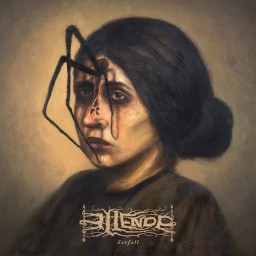
 Saxy S
Saxy S
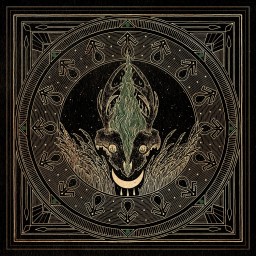
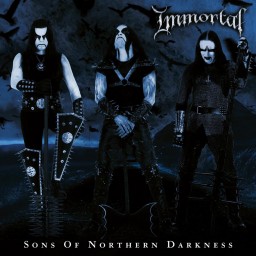
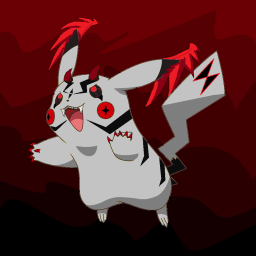 SilentScream213
SilentScream213
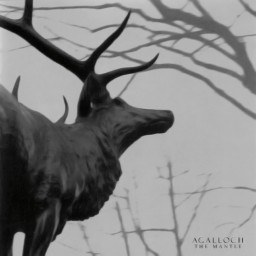
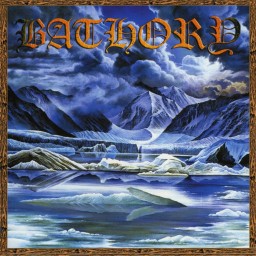
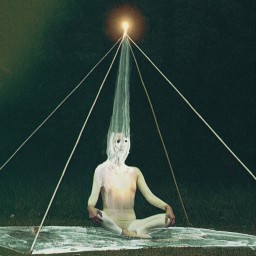
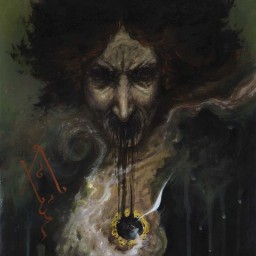 Vinny
Vinny
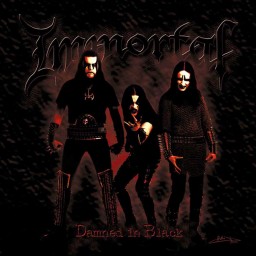

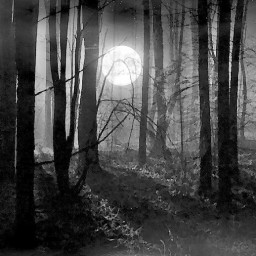 Sonny
Sonny
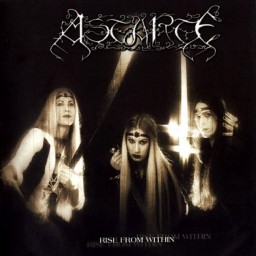
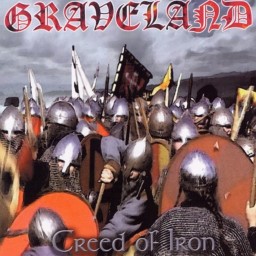
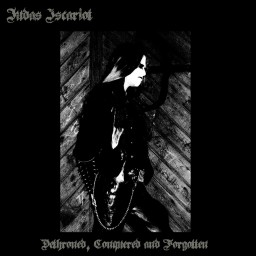
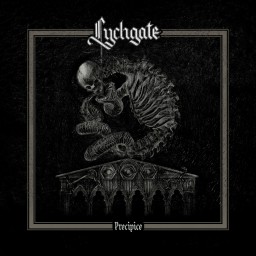
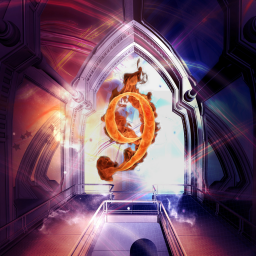 Shadowdoom9 (Andi)
Shadowdoom9 (Andi)
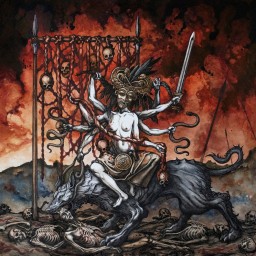
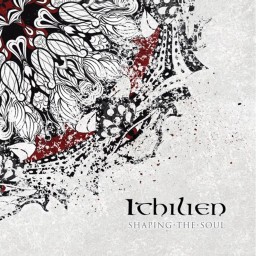
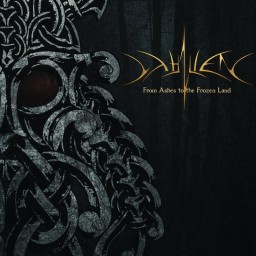
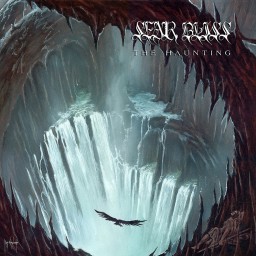
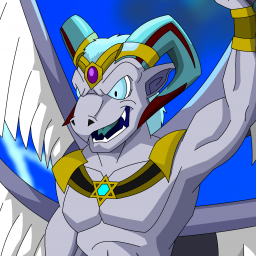 Rexorcist
Rexorcist
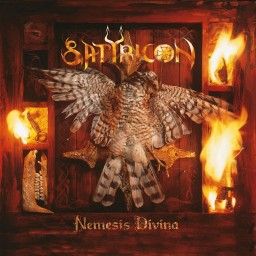
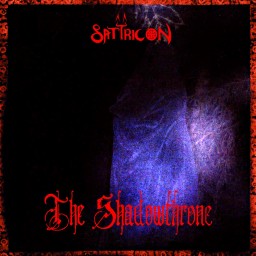
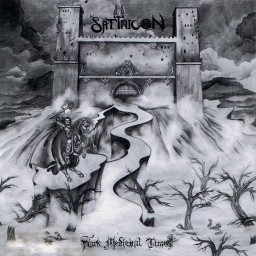
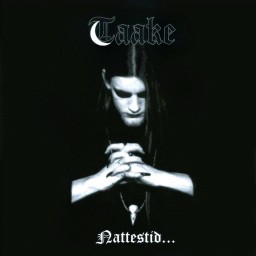
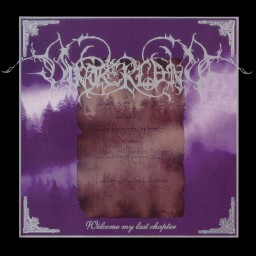
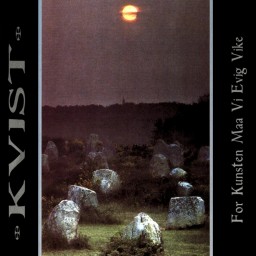
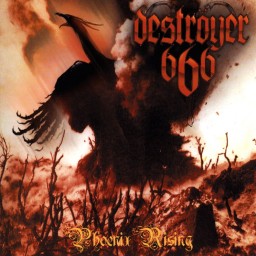
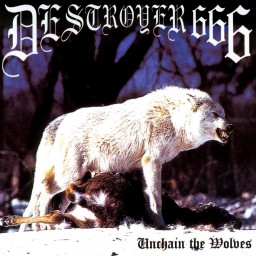
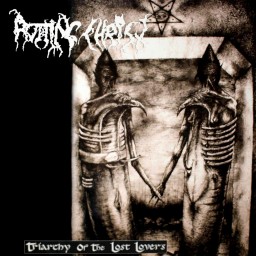
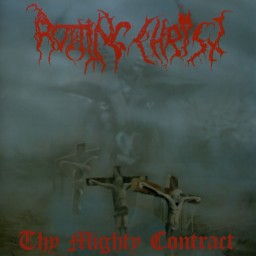
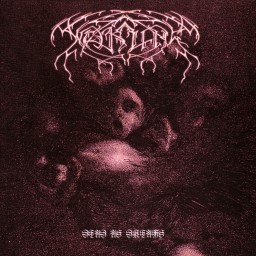
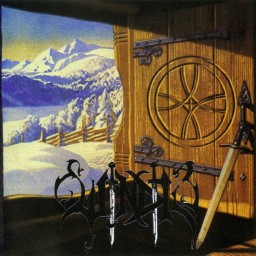
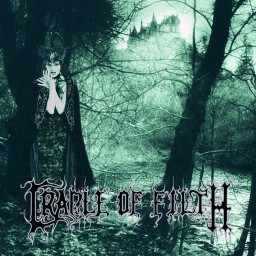
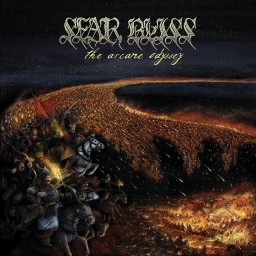
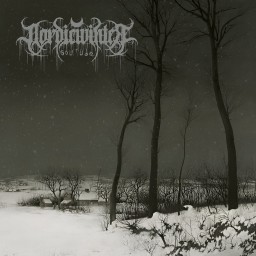
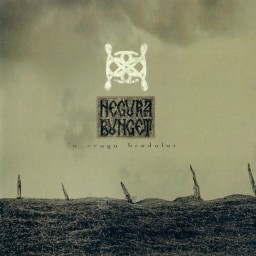
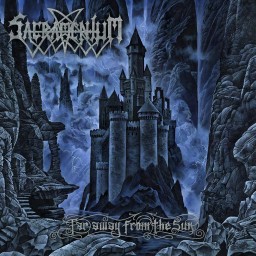
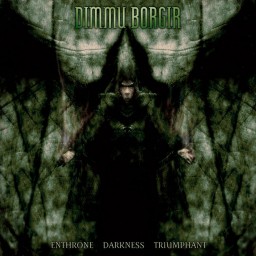
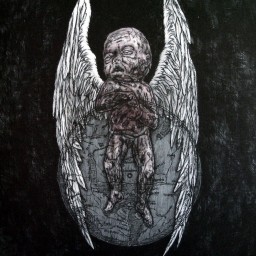

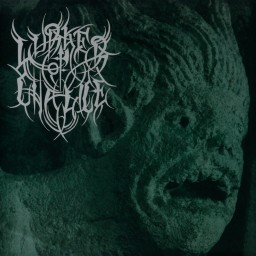
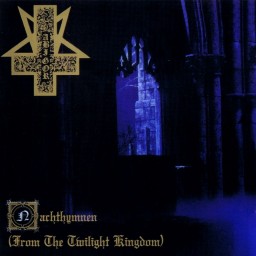
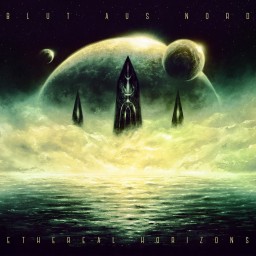
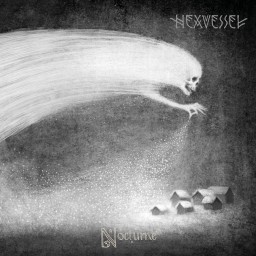
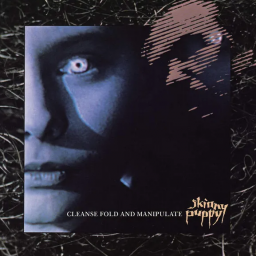 silentsteps
silentsteps


